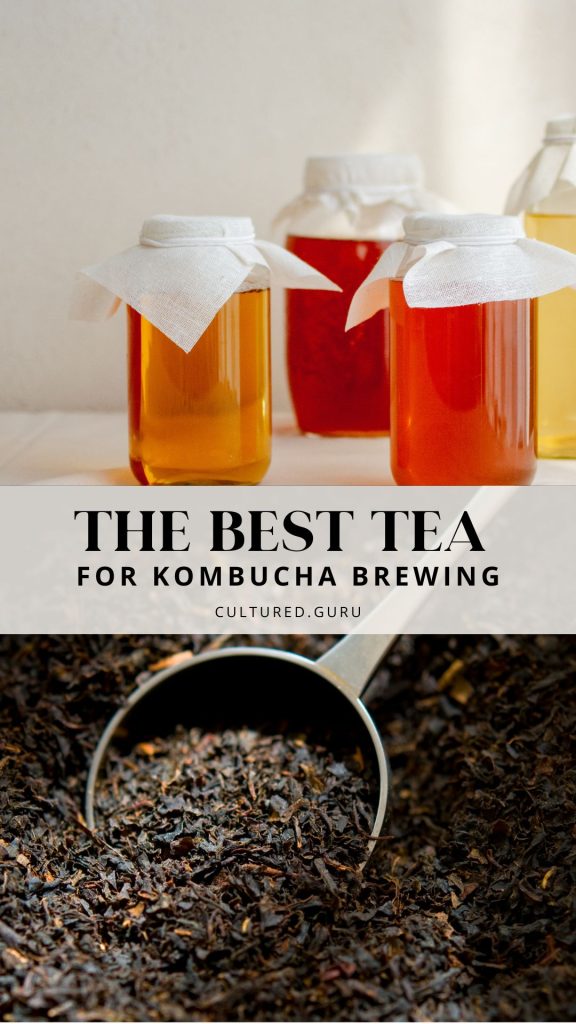Choosing the Best Tea for Kombucha Brewing

Are you wondering what is the best tea for kombucha? When it comes to kombucha, choosing the right tea is essential for making the best-tasting and healthiest brew. While any tea can be used to make kombucha, some teas work better than others. In this post, we’ll explore the best teas for kombucha brewing and help you decide based on your preferences.
The Best Tea For Kombucha
I worked at a tea shop for a couple of years in college. So not only am I a food microbiologist, but I also have a good bit of expertise in tea.
Let’s start with my two favorite tea types: green and black. Black and green teas are the most commonly used teas for making kombucha. They are both rich in tannins, which help the fermentation process and kombucha flavor.
Black tea, in particular, is a favorite among kombucha brewers because it has a strong and distinct flavor that complements kombucha’s tangy and slightly sweet taste. You need not do what is popular, though; there are many options when picking the best tea for kombucha.

Choosing the Best Tea for Kombucha
When choosing the best tea for kombucha, it ultimately comes down to personal preference. Some people prefer black tea’s bold and robust flavor, while others prefer green tea’s lighter and more delicate flavor.
No matter what tea you choose, buy organic tea if you can!
It’s important to experiment with different types of tea to find the one that works best for you.

Black Tea for Kombucha
Black tea is the most commonly used tea for kombucha brewing. It is rich in tannins, which provide the perfect environment for the SCOBY (Symbiotic Culture of Bacteria and Yeast) to thrive.
Also, the caffeine in black tea provides an energy boost that can benefit those who need a pick-me-up. The caffeine is still present after fermentation since the microbes don’t break it down like they break down sugar.
Avoid black tea with oils, flavorings, and spices when making kombucha with black tea.
Here are some black tea varieties and blends you should avoid:
- Earl grey
- London fog
- Chai
And here are some links to plain black tea varieties I recommend for Kombucha:

Green Tea for Kombucha
Kombucha, made with green tea, is a refreshing drink that offers a range of potential health benefits, including improved digestion and immune function.
Green tea is an excellent choice for brewing kombucha due to its delicate flavor profile and high antioxidant content. It’s also a popular choice for those looking to reduce their caffeine intake. It still contains caffeine, but significantly less than black tea.
One type of green tea kombucha that has gained popularity in recent years is Jun. Jun is a kombucha made with green tea and honey instead of black tea and sugar. It has a slightly sweet and tangy profile with a subtle honey flavor.
Jun is often called the “champagne of kombucha” due to its extra effervescence and light flavor, and it’s my favorite kombucha to make.
I lump two other teas into the “green tea” category: white and oolong. They have a caffeine content similar to green tea and a similar flavor profile.
Both oolong and white tea are great options for brewing kombucha.
As with black tea, it’s important to use plain green tea with no flavorings or additives. Here are links to my favorites:

Brewing Caffeine Free Kombucha
While black and green tea are the most commonly used teas for brewing kombucha, you can also use herbal teas to create a unique and flavorful brew.
Herbal teas are an excellent option for those who want to avoid caffeine or prefer a different flavor profile in their kombucha. It’s important to remember that not all herbal teas contain tannins, and the lack of tannins can change the flavor and mouth feel of kombucha.
Without tannins, the fermentation process may be slower, and the resulting kombucha may not be as effervescent as a traditional black or green tea brew.
When choosing an herbal tea for kombucha brewing, it’s important to select a tea made from pure herbs and botanicals that aren’t known to be antimicrobial.
Some popular herbal teas that can be used for kombucha brewing include rooibos, lemongrass, red raspberry leaf, and hibiscus. These teas offer a range of flavors and potential health benefits, making them an excellent choice for experimentation.
One important consideration when using herbal teas for kombucha brewing is the possibility of additives. Some herbal teas may contain added sugars, artificial flavors, or preservatives, which can impact the fermentation process and the final product.
Always read the ingredient panel and verify the tea is made from 100% real herbs.
Here are a few high-quality herbal teas made from pure ingredients I recommend:

Bags or Loose-leaf Tea?
Tea comes packaged in two main options: tea bags and loose-leaf tea. While both options can create delicious and healthy kombucha, some key differences exist.
Tea bags are a convenient option for brewing kombucha, as they are easy to use and require no measuring or preparation. Drop a few tea bags into the brewing vessel and let it steep. However, the quality of tea in tea bags can be lower than loose-leaf tea, as the tea leaves are typically broken down into smaller pieces. This can result in a weaker brew with less flavor and aroma.
On the other hand, loose-leaf tea is usually of higher quality which can result in a more flavorful and aromatic kombucha. Loose-leaf tea is typically made up of whole tea leaves, which can retain more of their natural oils and flavor compounds. Also, loose-leaf tea can offer more variety, as more options are often available than in tea bags.
To brew kombucha with loose-leaf tea, I use my French press to make a tea concentrate and then add that to some boiled sugar water. How much I use depends on how big a batch I make.
My Top Favorite Teas for Kombucha
In conclusion, black and green tea are the best teas for kombucha brewing, but any type of tea can be used depending on personal preference.
Don’t be afraid to experiment with different teas to find the one that works best for you.
Remember, kombucha can be made with various teas and even herbal teas. So, get creative and make the perfect brew that suits your taste buds and lifestyle!
I’ll leave you with this shoppable list of my top five go-to teas for brewing delicious kombucha:

The best tea for kombucha is just the start. Learn how to brew kombucha in our online course!
Enrolling in our online courses is a great choice if you are just getting started fermenting foods and drinks at home! We teach you how to ferment the most delicious foods and drinks at home and how to get it right on the very first try.



Yes, I recently wondered exactly this! When you say no flavorings or additives, does that include dried fruit? I have some brewing that had dried apples and pineapples in the loose tea.
No, real dried fruit should be fine. Sounds delightful!